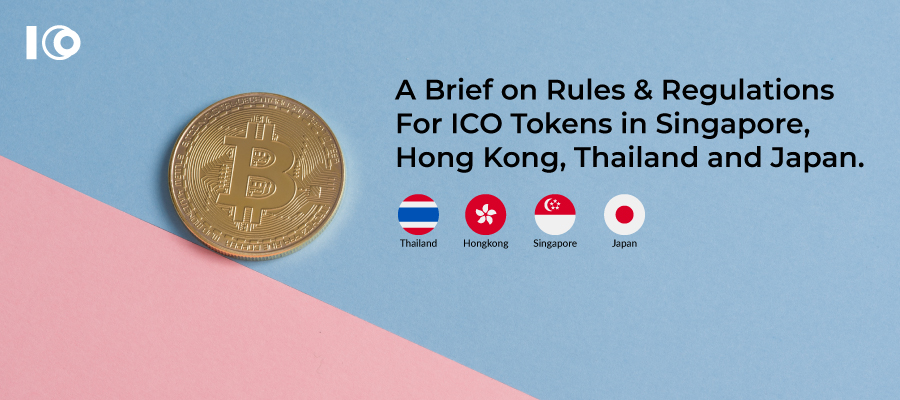The ICO development takes place at a global level. An ICO development company in India can issue ICO tokens in other countries but not its own country reason being the ICO token ban by the Government of India. But still, you can invest and issue ICOs in other state proves that studying rules and regulation for ICO tokens in various countries is necessary as it can affect your enterprise blockchain. Continuing the three-part series, following are some Asian countries which might affect your ICO development and ICO token performance in exchange market:
ICO Token Rules in Singapore
Singapore is the home to many high net worth investors and is the financial hub where many financial institutions have its headquarters. So it was normal that the country became one of the centers of the cryptocurrency exchange market. In the past couple of years, The Monetary Authority of Singapore (MAS) has released following regulations to control unpredictable ICO token market situations:
- If an ICO token is backed by any capital market products or any security or contract which leverages the purpose of foreign exchange trading, then it will be regulated under the keen eye of MAS.
ICO Development Company, ICO token issuers and ICO token investors need to register or obtain a license if the tokens fall into any of the category
- If an ICO token is backed by security, it will need to provide ownership in the blockchain based platform, if a debenture supports it, then it should signify indebtedness towards investors, and if it’s a unit of a collective investment scheme (CIS) it should mean a right to acquire in that CIS.
- Further, ICO Development Company, ICO token issuers and ICO token investors need to register or obtain a license if the tokens fall into any of the category mentioned above.
ICO Token Rules in China (Hong Kong)
China holds a significant power concerning cryptocurrency mining comparing to other major countries, but China has banned investment and issuing of an ICO token. The reason behind this ban was the similar features it offered reflecting traditional securities. And ICO tokens are without a boundary and are unregulated in many countries which can affect the well-being of Chinese citizens. However, Hong Kong, one of the cities of China allows ICO development and ICO token investments. Hong Kong has a separate political environment which will enable it to work independently from country’s regulations. The regulations of China as well as of Hong Kong are the following:
- As mentioned earlier, an official notice by the Chinese Government states that it is illegal to engage in any activity related to ICO issue and ICO tokens.
- Moreover, an ICO issuer of other any other country issues ICO token to a Chinese investor will be considered as a criminal offense under article 6 of PRC Criminal Law and that issuer will be held liable to the Chinese Government.
- On the other side, Hong Kong doesn’t regard cryptocurrency any threat and consider it as just a “Virtual Commodity” which are not subject to any regulations. Still, ICO tokens fall into Securities and Future Commission (SFC) laws, and future structured regulations model will take place to benefit both ICO issuers and ICO token investors.
ICO Token Rules in Thailand
Thailand understood the potentiality of cryptocurrency and ICO token development and released a regulatory framework for ICO development companies. One of the major highlights of the released regulatory framework is the registration of ICO issuers and ICO Development Company. Following are other regulations which future ICO issuers should know:
- There are two objectives behind Thailand Government’s decision, First to regulate exchange market of ICO token and cryptocurrencies and second to collect tax on these digital asset’s revenue.
Payment for such securities is approved in Baht, and cryptocurrencies approved by SEC.
- The Securities and Exchange Commission (SEC) has divided ICO into three categories namely, Utility tokens, ICO tokens, and Cryptocurrencies.
- The ICO portals, before issuing ICO tokens to the public must register with SEC. Furthermore, SEC has defined types of investors, to whom ICO tokens can be offered:
- High net worth investors
- Venture capital firms
- Private equity firms
- Any who can invest limited to 300,000 Baht (Thailand currency)
- Payment for such securities is approved in Baht, and cryptocurrencies approved by SEC and other regulatory authorities of Thailand. These cryptocurrencies are BitCoin, Ethereum, BitCoin Cash, Ethereum Classic, Ripple, Litecoin, and Steller.
ICO Token Rules in Japan
Japan is yet to impose regulations on cryptocurrencies and ICO tokens. But one of the Government-backed institutions has proposed a guideline framework to be implemented by the Japanese Financial Regulatory Agency. These guidelines are to believe to benefit the Republic of Japan concerning growth and investment:
- The institution proposed that every ICO issuers and ICO development agencies should register under Payment services act as well as the acceptable mode of payment can be cryptocurrencies. Moreover, cryptocurrency exchange platforms will require registration as well.
- The KYC of ICO issuers to make mandatory which will protect investors’ investment interest in ICO tokens.
- Also, ICO issuers and ICO developers need to disclose whitepaper and other documents to protect investor’s interest as well as to avoid any money laundering activities.
These major Asian countries hold a considerable amount of share in the blockchain market. Other significant countries affecting the blockchain and ICO market the most will be followed in the next post.
We hope you have found this article informative and interesting. For more information or queries visit@icodevelopment.io and know more about this technology. You can also contact us or send us an email at sales@icodevelopment.io

